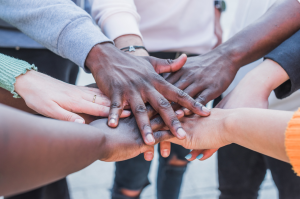The Asian American and Pacific Islander (AAPI) community has a long history of encountering racism and anti-Asian hate crimes in Canada and the United States that persist today. Recent events during the COVID-19 pandemic serve as a reminder of the xenophobic sentiments and violence directed towards this community. Between 2019 to 2020, the Vancouver Police Department reported a 717 percent surge in anti-Asian hate crimes, while Statistics Canada shared that individuals of Chinese, Korean and Southeast Asian descent experienced the highest increase in harassment or attacks compared to other visible minority groups in 2020 (read more here). The ongoing violence during that time placed significant mental and physical health on the community.
AAPI professionals are not immune to racial discrimination in the workplace either. In fact, over one in three Asian and Asian American professionals have reported experiencing racial prejudice at work. Furthermore, according to the same report, they are 17 percent less likely than White professionals to receive promotions, irrespective of their tenure. The researchers found that this can be attributed to a cultural value of community over individual advancement discouraging self-promotion for career progression, less executive representation, a scarcity of mentors within the company, and weaker networks compared to other marginalized groups.
Table of Contents
Honouring AAPI Heritage Month
As we observe AAPI Heritage Month, it’s crucial to learn from the experiences of the 50+ ethnicities and cultures that exist within the community, and confront the persistent myths and stereotypes affecting them. We will explore a few workplace experiences expressed to us from individuals in the AAPI community, discuss their implications and provide strategies for a more inclusive and equitable path forward.
We’ve highlighted some of the challenges that some AAPI professionals encounter in the workplace, and what allies and organizations can do to create an organizational culture that is inclusive for all.
"At a company Christmas gathering, a non-Asian colleague had asked where I was from. When they weren’t satisfied with the answer “Canada”, they pressed “OK, but where are you really from?”"
Expressions like “Your English is really great!”, making assumptions about someone’s ethnic background, or failing to make an effort to correctly pronounce a non-Anglicized name, are microaggressions racializing AAPI individuals as the “perpetual foreigners”. Underlying these statements is the belief that those who identify as AAPI do not belong in Western countries regardless of their citizenship status, effectively excluding AAPI individuals.
In the United States, about eighth-in-ten Asian Americans have experienced at least one incident related to this notion. In the workplace, these microinsults may diminish the sense of belonging, impact an individual’s sense of identity, and affect their mental well-being. They may shoulder the additional mental burden of code switching – altering their behaviour and participating in activities to conform to a more dominant culture.
“During my performance review, my manager’s feedback was to speak up more during meetings and to be more confident. A week later, a team member expressed that I was too aggressive and bossy during a meeting when I voiced concerns over a solution. As an East Asian woman, I grapple with the expectation that I should be submissive, and the risk I may be perceived as a “tiger mom” if I am too vocal.”
The model minority myth stereotypes the AAPI community as submissive, hardworking, economically and educationally successful individuals with innate academic talents, excelling in fields such as mathematics and science. However, the AAPI community is not monolithic and encompasses a wide range of lived experiences. While this portrayal may initially seem positive, this over-validation may place undue pressure on individuals to meet high expectations and potentially develop imposter syndrome.
As an ally, it’s essential to recognize that not all individuals within a marginalized group experience identical forms of oppression. Learn to identify and address microaggressions that may surface in day-to-day interactions. For instance, teams might disproportionately assign data-related projects to someone of AAPI descent, managers may erroneously steer individuals towards careers in technical fields without considering their interests, or professionals may be overlooked for promotion due to a perceived lack of leadership qualities or assertiveness.
"During COVID-19, a colleague checked-in on my well-being amidst all the violence against the Asian community. They were well-intentioned, however they expressed “I can imagine how it feels to suddenly experience this violence and racism."
The model minority myth exacerbates AAPI challenges by minimizing the racial discrimination encountered by the community, leading some to believe that their struggles are less significant compared to other people of colour. This misconception is often fueled by the false belief that AAPI individuals benefit from white privilege and are immune to racism, which only serves to invalidate their experience.
Consequently, DEI initiatives and policies may overlook the needs and experiences of the AAPI employees. It is important to recognize that understanding and addressing the challenges faced by AAPI individuals should not rely on comparisons with the experiences of other marginalized groups. Each group deserves empathy, acknowledgement, and equal support in combating racial discrimination and fostering an inclusive environment.
Take Action
In a workplace context, including AAPI perspectives into DEI initiatives not only promotes fairness and equity, but also enhances organizational culture and fosters a sense of belonging for all employees. Let’s review some strategies DEI teams can employ towards building equity and inclusion within their organization.
Review retention and promotion data within the organization, and evaluate management hiring criteria to guarantee there are no obstacles preventing AAPI representation in leadership positions.
Evaluate existing diversity initiatives to ensure they are inclusive of employees from the AAPI community.
Explore establishing mentorship programs to increase networking building opportunities with company leadership. Organizations may wish to partner and leverage their AAPI Employee Resource Group.
Support employee well-being by providing resources and support services, such as counselling or employee assistance programs, to provide a safe space to cope with the impact of stereotype-related stress and imposter syndrome, as well as a place to report transgressions.
Couple DEI initiatives with cultural awareness training that educates people on the rich history of the AAPI community in North America.
During training, recognize the intersectionality of identities within the AAPI community and consider how factors such as gender, socioeconomic status, and immigration status intersect with racial identity to shape an individual’s experience.
AAPI Heritage Month Workshops
Final Words
We’ve examined the various stereotypes facing the AAPI community and its impact on their sense of belonging and identity as both AAPI individuals and as Canadian/American. Just as the experiences within the group vary, so do the response to racism; some immigrant parents may be advised to avoid confrontation, while American/Canadian-born AAPI individuals may choose to stand their ground. With such a rich and diverse group of culture and experiences, it remains crucial to continue seeking opportunities to hear the perspectives of AAPI individuals.
A 2022 study interviewing Asian Americans/Canadians professionals on racial discrimination concluded with the necessity for “DEI training that acknowledges and addresses the unique experience that Asians have been enduring and will continue to endure long after the pandemic is over.” Ultimately, AAPI Heritage Month serves as more than a celebration of these vibrant cultures; it is also a reminder to ensure that DEI strategies capture and support the entire workforce equitably.




